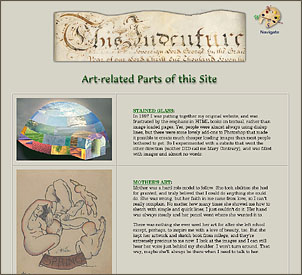structure, but it may be questioned whether the majority of them are aware of the
actual relation between the weaver of the web and the weaver of the lace, as it was
established in mythological times. According to the classic legend, Arachne was a beautiful
young maiden of Lydia, who particularly excelled in the art of lacemaking. The creations of
her skill were so lovely that they ensnared the hearts of all her sex, for even in the Golden Age,
when beauty unadorned waas supposed to be adorned the most, the congenital love of women for objects
of person adornment made itself felt. By an accident the goddess Minerva happened to destroy one of
her laces which Arachne esteemed to be her masterpiece, and the poor artist, rendered frantic by despair,
committed suicide by hanging herself. Minerva, in atonement for the wrong she had done her, converted
her into a spider, and to this day Arachne weaves her mystic web as she did in the past, and as far as their
love of lace goes, all women worship her now as they did of old. in Le Quesne's picture, the nymphs of
his artistic Aracdia are enjoying their entanglement in the silken toils of their transformed sister,
and those who are not already entangled hurry eagerly forward to seek the same filmy bondage.
Alfred Henri Bramtot was born in Paris, and is a pupil of W.A. Bouguereau.
That he was a diligent and progessive pupil is evidence by the fact that he took the Prix de Rome
for painting in 1879, and that he has since become one of the notable painters of the figure of whom France
has just cause to boast. History and religious motives occupy hsi chief attention, but he has painted
many beautiful genre pictures of scenes of country life around his summer villa. "Bashful Love"
won him his first Salon medal, in 1879, the same year that he gained the Roman
Back Forward
Chapter 12 Text
Louis Hierle
|
|





![]() Copyright © 2007, Mary S. Van Deusen
Copyright © 2007, Mary S. Van Deusen